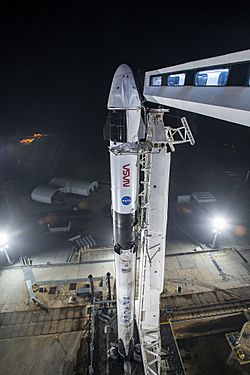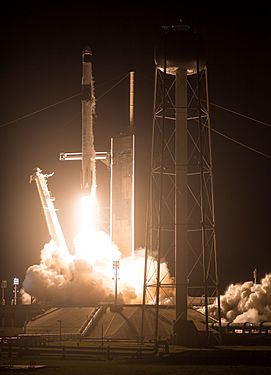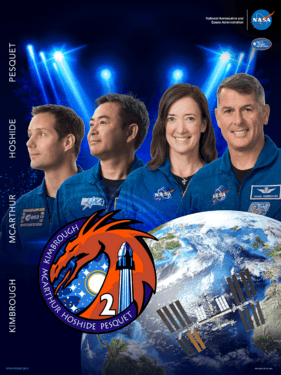SpaceX Crew-2 facts for kids
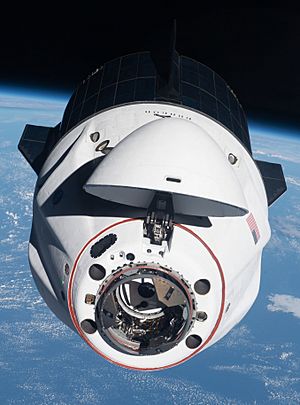
Endeavour approaches the ISS
|
|
| Names | USCV-2 (2012–2019) Crew-2 |
|---|---|
| Mission type | ISS crew transport |
| Operator | SpaceX |
| Mission duration | 199 days, 17 hours and 43 minutes |
| Spacecraft properties | |
| Spacecraft | Crew Dragon C206 Endeavour |
| Spacecraft type | Crew Dragon |
| Manufacturer | SpaceX |
| Launch mass | 12,055 kg (26,577 lb) |
| Landing mass | 9,616 kg (21,200 lb) |
| Crew | |
| Crew size | 4 |
| Members |
|
| Expedition | Expedition 65 / 66 |
| EVAs | 4 |
| EVA duration | 27 hours and 22 minutes |
| Start of mission | |
| Launch date | 23 April 2021, 09:49:02 UTC |
| Rocket | Falcon 9 Block 5 (B1061.2) |
| Launch site | Kennedy Space Center, LC-39A |
| Contractor | SpaceX |
| End of mission | |
| Recovered by | GO Navigator |
| Landing date | 9 November 2021, 03:33 UTC |
| Landing site | Gulf of Mexico |
| Orbital parameters | |
| Reference system | Geocentric orbit |
| Regime | Low Earth orbit |
| Inclination | 51.66° |
| Docking with International Space Station | |
| Docking port | Harmony forward |
| Docking date | 24 April 2021, 09:08 UTC |
| Undocking date | 21 July 2021, 10:45 UTC |
| Time docked | 88 days |
| Docking with International Space Station (relocation) | |
| Docking port | Harmony zenith |
| Docking date | 21 July 2021, 11:36 UTC |
| Undocking date | 8 November 2021, 19:05 UTC |
| Time docked | 110 days |
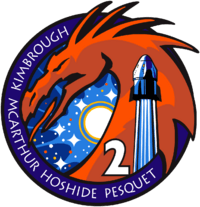 SpaceX Crew-2 mission patch 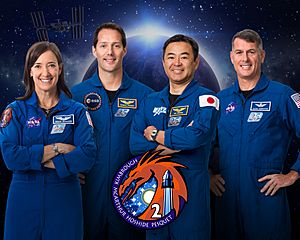 McArthur, Pesquet, Hoshide and Kimbrough Commercial Crew Program
|
|
SpaceX Crew-2 was an important space mission. It was the second time a Crew Dragon spacecraft carried astronauts for a regular trip. This mission was part of the Commercial Crew Program. The spacecraft launched on April 23, 2021, and reached the International Space Station (ISS) the next day.
The Crew Dragon capsule used for this flight was named Endeavour. It had flown to space before on the Crew Dragon Demo-2 mission. The rocket that launched it, a Falcon 9, also had a previous flight. This was special because it was the first time astronauts flew on a rocket booster that had been used before. The mission set a new record for the longest spaceflight by a U.S. crewed spacecraft, lasting 199 days.
Contents
About SpaceX Crew-2
This mission was a big step for space travel. It showed that spacecraft and rockets could be reused safely. Reusing parts helps make space travel more affordable. The main goal was to take astronauts to the International Space Station. They would live and work there for many months.
Meet the Astronauts
Four astronauts were part of the Crew-2 mission. They came from different space agencies around the world.
| Position | Astronaut | |
|---|---|---|
| Spacecraft commander | Expedition 65 / 66 Third spaceflight |
|
| Pilot | Expedition 65 / 66 Second spaceflight |
|
| Mission Specialist 1 | Expedition 65 / 66 Third spaceflight |
|
| Mission Specialist 2 | Expedition 65 / 66 Second spaceflight |
|
All four astronauts had flown to space before. For Megan McArthur, this was her first time visiting the ISS. Her first flight was to the Hubble Space Telescope. Interestingly, she sat in the same seat on Endeavour that her husband, Bob Behnken, used on a previous mission.
Akihiko Hoshide became the second Japanese astronaut to command the ISS. Thomas Pesquet named his mission Alpha. This name comes from Alpha Centauri, which is the closest star system to Earth.
The Mission Journey
The Crew Dragon Endeavour (C206) launched on April 23, 2021. It connected to the Harmony module of the ISS. This docking happened on April 24, 2021.
Later, on July 21, 2021, the Crew Dragon moved to a different port on the ISS. This move was to make space for another spacecraft, the Boeing Starliner.
For a short time in September 2021, three Dragon spacecraft were in space at once. This included Crew-2, a cargo Dragon, and the Resilience capsule from the Inspiration4 mission.
Launch Day Timeline
Here are some key moments from the launch day:
- Crew Wake-up: Astronauts woke up very early, around 3:09 AM UTC.
- Suit Up: They put on their special spacesuits and checked them.
- Travel to Launchpad: The crew rode in a Tesla Model X to Launch Complex 39A.
- Boarding the Capsule: The astronauts got into the Crew Dragon spacecraft.
- Hatch Closing: The hatch was closed, sealing them inside.
- Fueling: The rocket was filled with fuel.
- Launch Escape System Armed: The system designed to pull the capsule away in an emergency was made ready.
- Liftoff! At 09:49:02 UTC, the Falcon 9 rocket lifted off the pad.
- Max Q: The rocket went through the point of greatest stress from the air.
- Stage Separation: The first stage of the rocket separated.
- Second Stage Firing: The second stage engine fired to push the capsule higher.
- First Stage Landing: The first stage of the rocket landed safely back on Earth.
- Capsule Separation: The Crew Dragon separated from the second stage, now in orbit.
- Nosecone Open: The nosecone of the Dragon opened, revealing its docking port.
Docking and Hatch Opening
- Approach to ISS: The Dragon spacecraft began its final approach to the ISS on April 24.
- Soft Capture: The capsule gently connected to the ISS.
- Hard Dock: The Dragon fully docked to the ISS.
- Hatch Opened: The hatch between the Dragon and the ISS opened, allowing the astronauts to enter the station.
-
Falcon 9 and Endeavour launch from LC-39A, at the Kennedy Space Center, with the SpaceX Crew-2 crew members aboard, on Friday, April 23rd, 2021
Wake-up Calls in Space
Astronauts often get special wake-up calls in space. This tradition started with the Gemini program. The songs are chosen by the astronauts' families. They often have a special meaning to the crew.
| Flight Day | Song | Artist | Played for | Links |
|---|---|---|---|---|
| Day 2 | An off-key, all flute comedic cover of A-Ha's "Take On Me", made by YouTube artist "Shittyflute". | A-ha (original) Shittyflute (Cover) |
Thomas Pesquet | [1] |
Returning Home
The Crew-2 astronauts returned to Earth on November 9, 2021. They undocked from the ISS on November 8. Their return was a bit different. Usually, one crew arrives before the previous one leaves. But due to weather and a small health issue with the next crew, Crew-2 came home first. This was the first time a Crew Dragon mission had an "indirect handover" of crews. The capsule splashed down safely off the coast of Florida.
See also
 In Spanish: SpaceX Crew-2 para niños
In Spanish: SpaceX Crew-2 para niños
 | Aurelia Browder |
 | Nannie Helen Burroughs |
 | Michelle Alexander |


